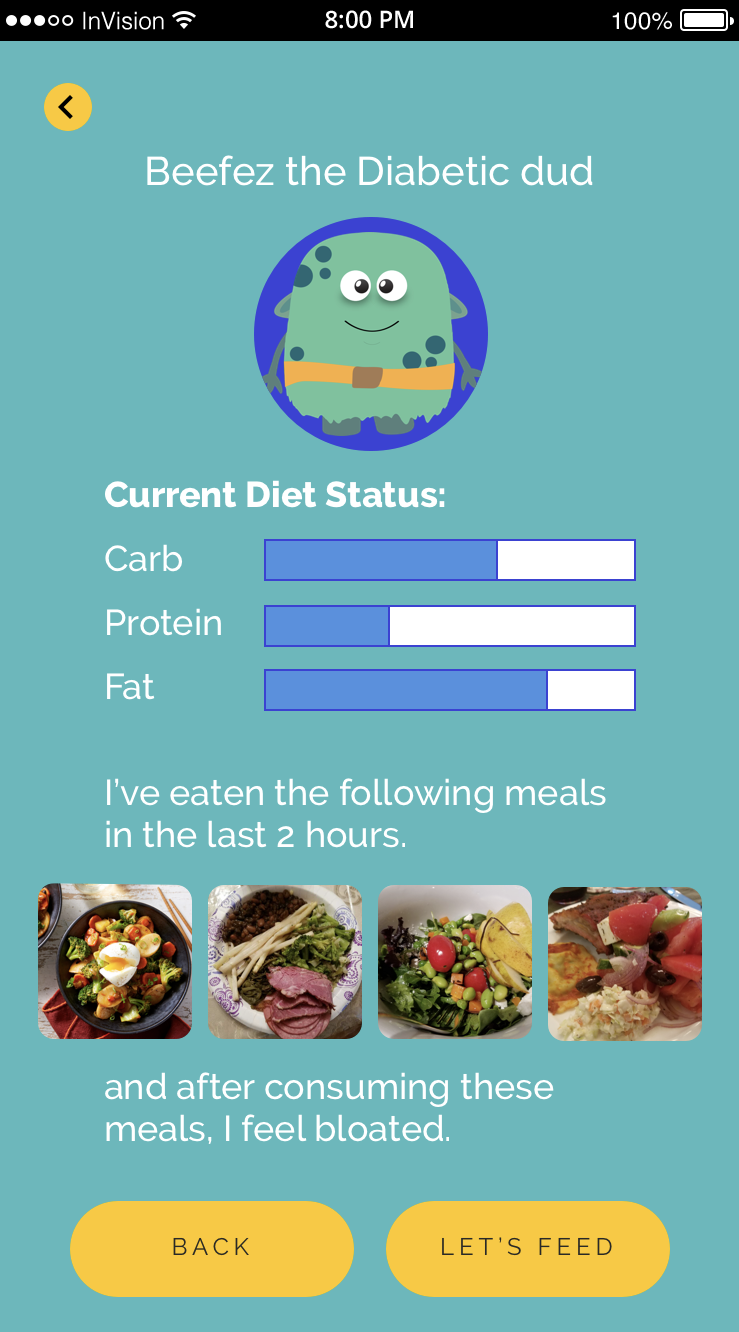Research Statement
Research (selected publications)
Personal Health Oracle: Explorations of Personalized Predictions in Diabetes Self-Management -
Pooja Desai, Elliot Mitchell, Maria Hwang, Matthew Levine, David Albers, Lena Mamykina -
SIGCHI (2019)
Let Me Help You Learn from My Meal: User-Generated Meal Photos as a Benchmark for Nutritional Estimation -
Maria Hwang, Lena Mamykina -
CLS (2018)
Monster Appetite: Effects of Subversive Framing on Nutritional Choices in a Digital Game Environment -
Maria Hwang, Lena Mamykina -
SIGCHI (2017)
Game Based Teaching for Youth Health: Testing a Board Game, Monster Appetite, for Classroom Implementation - (Poster)
Maria Hwang -
AERA (2016)
Design Decisions and Educational Games: Insights for Acceptance -
Charles Kinzer, Maria Hwang, Pantiphar Chantes, Ahram Choi, and Shuyi Hsu -
GLS11 (2015)
Communalizing the Interfaces of Single Player Games - (Extended Abstract)
Mark Santolucito, Maria Hwang -
DiGRA (2014)
Raid the fridge!: Promoting Healthy Eating Habits through the Game Monster Appetite (Poster: Best of Show)
Maria Hwang, Pantiphar Chantes, Mark Santolucito -
GLS10 (2014)
Projects (selected on-going research)

Leveraging Social Computing Platforms for Nutritional Assessment
Investigators: Maria Hwang, Lena Mamykina
Nutritional assessment of meals is important for the management of chronic diseases. In the context of diabetes self-management, the ability to estimate inclusion of different macronutrients (i.e., carbohydrates, proteins, fats, and fiber), particularly carbohydrates in a meal can directly impact glycemic control, and therefore one’s health and wellness. However, previous research has shown that people have limited ability to accurately estimate nutritional composition of a given meal, which often leads to unhealthful eating habits. Traditional methods of estimating nutritional composition of a meal (as in diabetes education) can require many steps, particularly for complex meals that include multiple ingredients. Recent advances in social computing platforms and self-monitoring technologies that allow individuals to share records with each other present new opportunities for nutritional literacy improvement interventions that rely on photo-collections of meals captured by many individuals. In our research, we continue to develop novel informatics solutions leveraging these user-generated meal photographs and their macronutrient-compositional evaluations as benchmarks for estimating nutrition of un-evaluated meals. The goal of this project is to compare these new informatics solutions to the traditional diabetes education based approaches for accurate and efficient nutritional composition estimation of meals. This is an ongoing investigation with analyses and papers to follow.
#SocialComputingPlatforms #SelfMonitoring #DiabetesManagement #NutritionalAssessment
#NutritionalEstimation #MealComposition #MealPhotographs #Macronutrients

Feed Me Data: Overcoming the Cold Start Problem for Personal Analytics Solutions in Health
Investigators: Maria Hwang, Matthew Levine, Lena Mamykina
Personalized health systems generate data-driven advice or feedback to users based on their available medical history. While an effective strategy, such systems struggle to handle new users when no or very little historical data is available. This is a serious impediment to both scalable research and the real-world deployment of novel personalized health systems. We investigate strategies to provide health recommendations in the context of data poor users. Based on insight from our approaches, we frame the initialization of personalized health systems as a special case of the "cold start" problem faced by Recommender Systems (RS) more generally. Our team released a free app, GlucOracle, to the App Store and Google Play Store in April, 2017. GlucOracle is an app for personal meal-time forecasting in diabetes. It utilizes computational machinery that uses a statistical framework (data assimilation) to generate personalized, nutrition-driven, real-time forecasts of blood glucose. We use a prediction-correction scheme to incorporate self-monitoring data into mechanistic models of physiologic glucose-insulin regulation. In this way, GlucOracle can provide in-the-moment, statistically grounded predictions based on a user’s impending meal choices and most recent glucose measurements. However, this model needs logged meals and BG readings from the user initially for a period in order to properly personalize the BG forecasts. Based on this GlucOracle experience, we contextualize the existing approaches to the health "cold start" problem, and highlight the unique interaction challenges and opportunities available to the personalized health domain. This project is an ongoing project and aims to share solutions to cold-start problems in data driven interventions with analyses and more papers to follow.
GucOracle website that I designed
#ColdStart #RecommenderSystems #DataDrivenInterventions #PersonalizedHealth
#DataPoorUsers #Type2Diabetes #BloodGlucose #mHealth #GlucOracle

 From years of teaching, years of being a student in different capacities, and years of observing my parents teach, I have witnessed the power of providing educational opportunities in any learning environment. Education has become an over-specified and over-defined term as we navigate through the failures and successes in history, defined by the accomplishments we have achieved in life. However, as John Dewey once mentioned, "education is not preparation for life; education is life itself." In any circumstance, we can find learning, we can find opportunities, and we can find growth. Alongside my fellow World Scholars, I have witnessed talent that utilizes every bit of our lives to find learning and meaning in them.
From years of teaching, years of being a student in different capacities, and years of observing my parents teach, I have witnessed the power of providing educational opportunities in any learning environment. Education has become an over-specified and over-defined term as we navigate through the failures and successes in history, defined by the accomplishments we have achieved in life. However, as John Dewey once mentioned, "education is not preparation for life; education is life itself." In any circumstance, we can find learning, we can find opportunities, and we can find growth. Alongside my fellow World Scholars, I have witnessed talent that utilizes every bit of our lives to find learning and meaning in them.